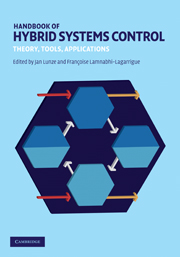
-
Select format
-
- Publisher:
- Cambridge University Press
- Publication date:
- February 2011
- October 2009
- ISBN:
- 9780511807930
- 9780521765053
- Dimensions:
- (247 x 174 mm)
- Weight & Pages:
- 1.28kg, 582 Pages
- Dimensions:
- Weight & Pages:
You may already have access via personal or institutional login
Book description
Setting out core theory and reviewing a range of new methods, theoretical problems and applications, this handbook shows how hybrid dynamical systems can be modelled and understood. Sixty expert authors involved in the recent research activities and industrial application studies provide practical insights on topics ranging from the theoretical investigations over computer-aided design to applications in energy management and the process industry. Structured into three parts, the book opens with a thorough introduction to hybrid systems theory, illustrating new dynamical phenomena through numerous examples. Part II then provides a survey of key tools and tool integration activities. Finally, Part III is dedicated to applications, implementation issues and system integration, considering different domains such as industrial control, automotive systems and digital networks. Three running examples are referred to throughout the book, together with numerous illustrations, helping both researchers and industry professionals to understand complex theory, recognise problems and find appropriate solutions.
Contents
Metrics
Altmetric attention score
Full text views
Full text views help Loading metrics...
Loading metrics...
* Views captured on Cambridge Core between #date#. This data will be updated every 24 hours.
Usage data cannot currently be displayed.
Accessibility standard: Unknown
Why this information is here
This section outlines the accessibility features of this content - including support for screen readers, full keyboard navigation and high-contrast display options. This may not be relevant for you.
Accessibility Information
Accessibility compliance for the PDF of this book is currently unknown and may be updated in the future.


